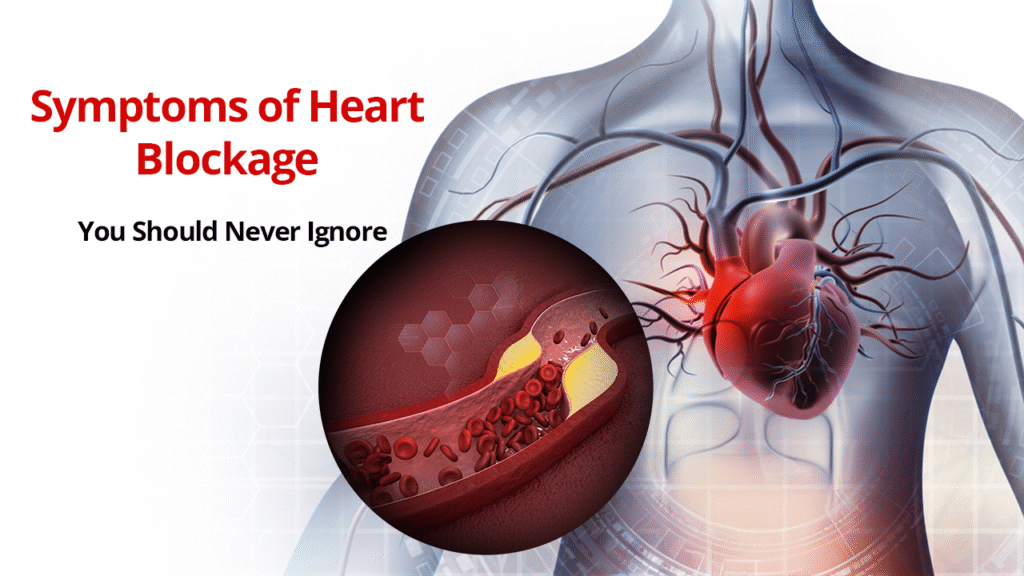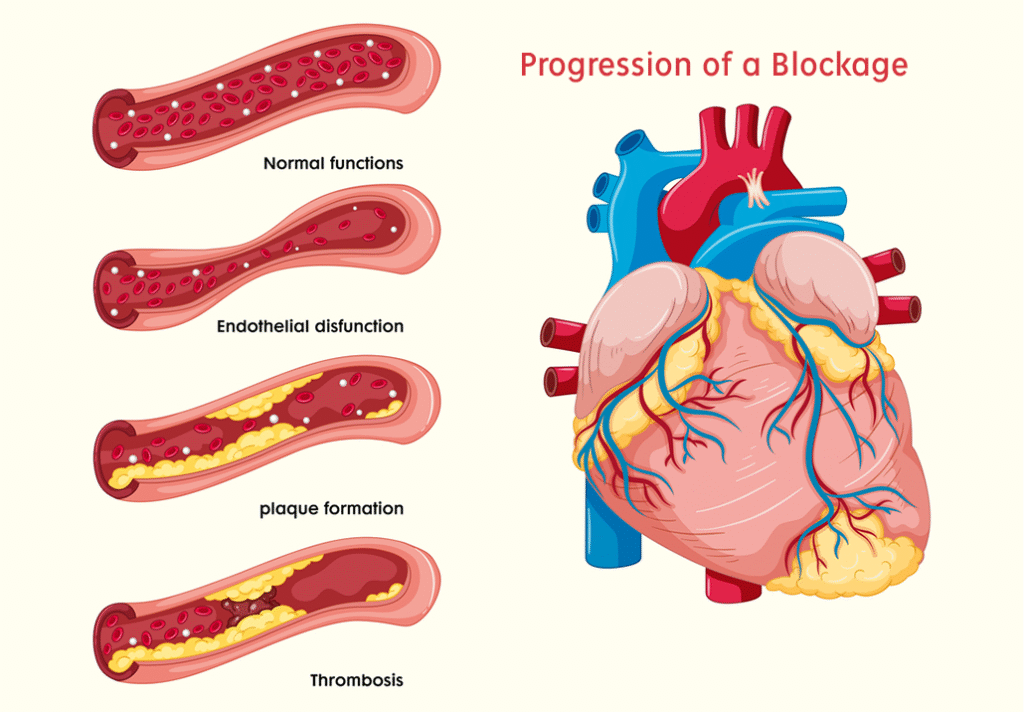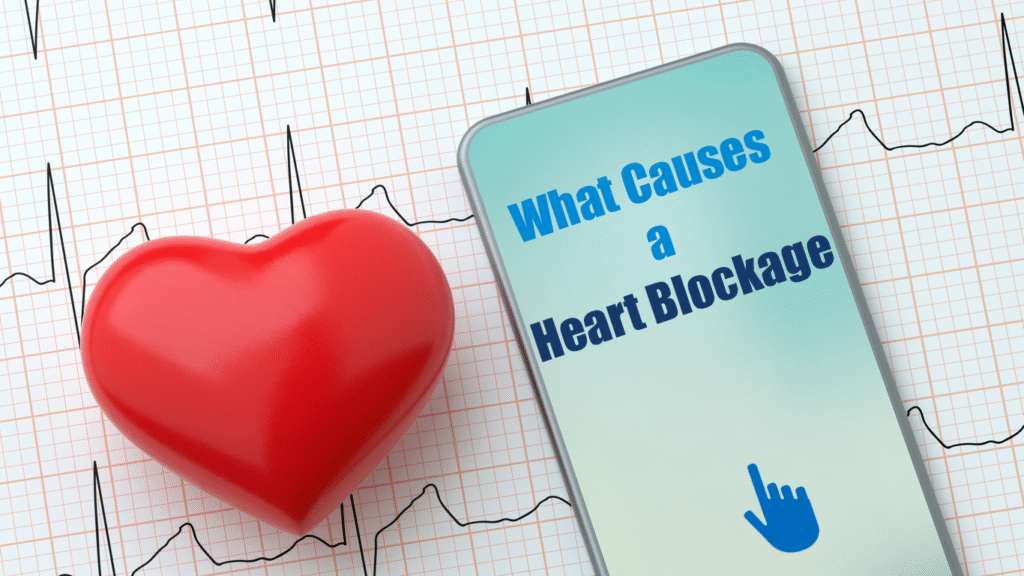Symptoms of Heart Blockage You Should Never Ignore

Your heart works hard for you every second of the day. But what if one of its main arteries starts to narrow or clog? The signs can be subtle—or screaming for attention. In either case, ignoring them could lead to a life-threatening event.
Let’s walk through the red flags you should never overlook.
What Is a Heart Blockage?

A heart blockage occurs when the blood vessels that supply the heart (called coronary arteries) become narrowed or blocked, usually by plaque buildup. This restricts blood flow, and your heart muscle can’t get the oxygen it needs. Left untreated, it can cause a heart attack.
Why Early Detection Is Crucial
Catching a blockage early means the difference between a manageable condition and a medical emergency. Think of it as a traffic jam in your arteries—ignore it too long, and it could lead to a full-blown pile-up.
That’s why understanding the symptoms is so important.
Classic Symptoms That Point to a Heart Blockage
Some signs are unmistakable. If you notice any of these, take them seriously.
Chest Pain or Pressure (Angina)
This is the most common symptom. It may feel like:
- A tight band around your chest
- Pressure or squeezing
- Burning or aching that comes and goes
It often shows up during physical activity or emotional stress—and eases with rest.
Shortness of Breath
Struggling to catch your breath while walking, climbing stairs, or even at rest? That could be a sign your heart isn’t getting enough oxygen-rich blood.
Unusual Fatigue or Weakness
Feel exhausted doing things that used to be easy? Fatigue without reason, especially in women, can point to an underlying heart issue.
Lesser-Known Symptoms You Shouldn’t Dismiss
Not all heart blockages shout. Some whisper—and these subtle signs are easy to miss.
Jaw, Neck, or Back Pain
This isn’t your typical sore muscles. If the pain comes on suddenly, worsens with exertion, or doesn’t respond to usual treatments, consider a heart cause.
Nausea and Cold Sweats
Sudden nausea, indigestion, or cold sweats, especially when paired with chest discomfort, may signal a heart event in progress.
Light-headedness or Dizziness
Feeling faint or dizzy when standing, walking, or sitting could be due to reduced blood flow to the brain.
Signs Specific to Women
Heart blockage symptoms in women often differ. Many do not experience classic chest pain. Instead, they report:
- Extreme tiredness
- Trouble sleeping
- Anxiety
- Shortness of breath
- Jaw or upper back pain
Women are more likely to delay treatment, which can make symptoms worse. If in doubt, seek help immediately.
Silent Heart Blockage: When There Are No Symptoms
Sometimes, there are no warning signs at all. This is called “silent ischemia.” It is more common in:
- People with diabetes
- Older adults
- Those with a family history of heart disease
Routine check-ups at Northern Heart Hospital Penang can help detect issues before they become emergencies.
What Causes a Heart Blockage?

Several risk factors contribute to the narrowing of your arteries:
- High blood pressure
- High cholesterol
- Smoking
- Obesity
- Diabetes
- Lack of exercise
- Family history
Understanding these risks can help you take control before symptoms appear.
When to See a Heart Specialist
If you’ve experienced any of the symptoms above—even once—it’s time to schedule an appointment with a heart specialist.
At Northern Heart Hospital Penang, top-tier cardiologists are ready to guide you through testing, diagnosis, and treatment tailored to your unique condition.
How Heart Blockages Are Diagnosed
Your doctor may recommend one or more of the following:
- Electrocardiogram (ECG)
- Stress test
- Echocardiogram
- Coronary angiography
- CT coronary angiogram
Each of these helps pinpoint where and how severe the blockage is.
Treatment Options for Heart Blockages
Treatment depends on the severity:
- Lifestyle changes like a heart-healthy diet and exercise
- Medications to lower cholesterol, blood pressure, and prevent clotting
- Angioplasty and stenting to open the artery
- Bypass surgery to reroute blood around the blockage
Visit Northern Heart Hospital Penang to learn about the latest minimally invasive options and personalized treatment plans.
Preventive Steps to Protect Your Heart
You don’t have to wait for symptoms. Take proactive steps now:
- Eat more fruits, vegetables, and whole grains
- Move your body daily
- Quit smoking
- Monitor blood pressure and cholesterol
- Get regular check-ups
Need help with prevention? Northern Heart Hospital Penang offers full preventive cardiology programs.
Why Choose Northern Heart Hospital Penang?
Northern Heart Hospital Penang is a regional leader in cardiac care. With cutting-edge diagnostic tools, experienced heart specialists, and personalized treatment plans, they are committed to your heart’s health at every stage—from prevention to recovery.
Final Thoughts: Listen to Your Heart
Heart blockages are not just a problem for “older people.” They can happen to anyone—and often without dramatic warning signs. Your body gives you signals. Don’t ignore them.
Stay curious about your health. Stay connected to your symptoms. And above all, stay in touch with trusted care providers like those at Northern Heart Hospital.
FAQs
Q1: Can heart blockages go away on their own?
Not completely. While lifestyle changes can improve blood flow and reduce plaque buildup, most blockages need long-term management.
Q2: What does a blocked artery feel like?
You might feel tightness or pain in the chest, shortness of breath, or even symptoms in your back, arms, or jaw.
Q3: Is stress related to heart blockage?
Yes. Chronic stress can raise blood pressure and inflammation, contributing to artery damage over time.
Q4: Can young people develop heart blockages?
Absolutely. Poor diet, smoking, genetics, and lack of exercise can cause heart disease even in your 20s or 30s.
Q5: What’s the first step if I think I have symptoms?
Contact a cardiologist immediately. The team at Northern Heart Hospital Penang can schedule tests and guide your next steps.
